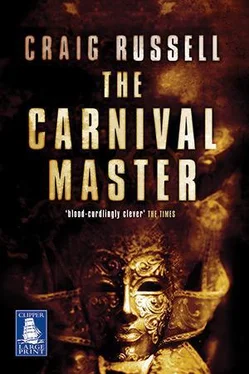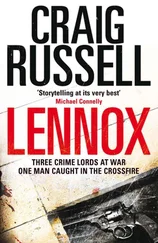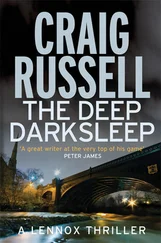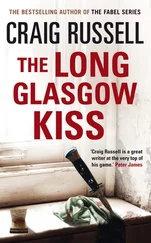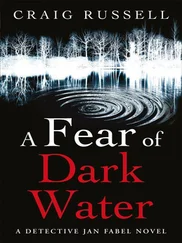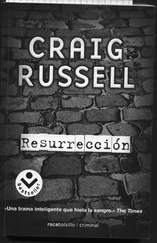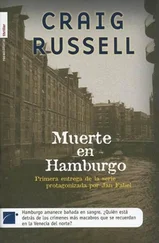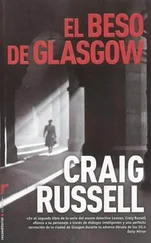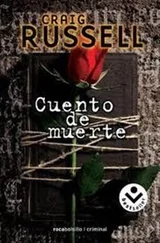Craig Russell - The Carnival Master
Здесь есть возможность читать онлайн «Craig Russell - The Carnival Master» весь текст электронной книги совершенно бесплатно (целиком полную версию без сокращений). В некоторых случаях можно слушать аудио, скачать через торрент в формате fb2 и присутствует краткое содержание. Жанр: Триллер, на английском языке. Описание произведения, (предисловие) а так же отзывы посетителей доступны на портале библиотеки ЛибКат.
- Название:The Carnival Master
- Автор:
- Жанр:
- Год:неизвестен
- ISBN:нет данных
- Рейтинг книги:3 / 5. Голосов: 1
-
Избранное:Добавить в избранное
- Отзывы:
-
Ваша оценка:
- 60
- 1
- 2
- 3
- 4
- 5
The Carnival Master: краткое содержание, описание и аннотация
Предлагаем к чтению аннотацию, описание, краткое содержание или предисловие (зависит от того, что написал сам автор книги «The Carnival Master»). Если вы не нашли необходимую информацию о книге — напишите в комментариях, мы постараемся отыскать её.
The Carnival Master — читать онлайн бесплатно полную книгу (весь текст) целиком
Ниже представлен текст книги, разбитый по страницам. Система сохранения места последней прочитанной страницы, позволяет с удобством читать онлайн бесплатно книгу «The Carnival Master», без необходимости каждый раз заново искать на чём Вы остановились. Поставьте закладку, и сможете в любой момент перейти на страницу, на которой закончили чтение.
Интервал:
Закладка:
Fabel made his way up to the top floor of the Alsterhaus. Susanne wasn’t there when he arrived, so he bought a coffee and sat in the cafe by the escalators and with a view of their agreed meeting place. He looked for a moment at the leaflet he had been handed by the Ukrainian. Fabel hadn’t come across the name ‘Holodomor’ before, but he had heard of the great starvation in the nineteen-thirties. In the nineteen-eighties, the Ukrainian serial killer Andrei Chikatilo had cited the Holodomor as part of the reason he had turned cannibal. Chikatilo’s brother had been murdered and eaten by starving villagers, but all that had been before Chikatilo’s birth. One detail that the campaigners, quite understandably, had chosen to omit from the leaflet was that the Holodomor had resulted in mass cannibalism. The Soviet authorities had set up special tribunals to try and execute people found to have consumed human flesh. Distraught parents had had to find secret burial places when a child died because it was so common for the corpse to be dug up as meat. Worse still, there had been many instances of parents killing and eating their own children. Even today in Ukraine, there was an unusually high number of serial murders involving cannibalism.
But for Fabel, Ukraine had only one significance: that it had been the dark cradle out of which Vasyl Vitrenko had crawled. It was maybe this thought that prompted Fabel to take out his mobile and call Maria Klee. The phone rang a few times, then the tone changed as his call was redirected to her cellphone. Her voice sounded flat and dull as she answered.
‘Maria? It’s Jan. I thought I’d give you a ring to see how you are doing. Is this a bad time?’ Fabel had had the idea that Maria hadn’t ventured out from her apartment much during her sick leave. He took her not being at home as a positive sign.
‘Oh, I’m fine…’ Maria sounded taken aback. ‘I’m just doing some shopping. How are you?’
‘I’m okay. Shopping too, in the Alsterhaus. How’s therapy going?’ Fabel winced at his own clumsiness. There was a short pause at the other end of the phone.
‘Fine. Making progress. I’ll be back at work soon. It won’t be the same without you.’
‘Is that good or bad?’ Fabel’s laugh sounded fake.
‘Bad.’ No laugh. ‘Jan… I think I might give it up too.’
‘Maria, you’re an excellent police officer. You still have a great future to look forward to.’ Fabel heard himself repeat what had been said to him so many times by his own superiors. ‘But it’s your decision. If there’s one thing I’ve learnt over the last couple of years, it’s that if you feel you have to do something, don’t wait. Do it.’
‘That’s exactly what I’ve been thinking. Recently… well, with all of the things that have happened…’ There was something about Maria’s voice – a detachedness, a remoteness – that emphasised for Fabel every centimetre of empty air it traversed on the crest of a microwave. It was the voice of someone lost and Fabel felt panic rise in his chest.
‘Maria… why don’t I come over later and see you? I think it would be good to talk…’
‘I would like that… but not now, Jan. I’m not ready to see anyone from work. I think… you know, with my therapy and everything… Actually, Dr Minks has said it would be better for me to avoid contact with colleagues for a while.’
‘Oh? I understand,’ Fabel said, although he didn’t. ‘Maybe soon.’
They said goodbye and Fabel hung up. When he looked up he saw that Susanne had arrived and was scanning the Alsterhaus for him.
CHAPTER THREE
19-21 January
1.
Maria switched off her cellphone before slipping it back into her jacket pocket. She hadn’t actually told Fabel a lie, but what she had done was effectively lying by omission.
The furnishings were typical budget hotel. She took her clothes from her suitcase and folded them into the cheap laminated chest of drawers, moving, as always, with economical precision. After Maria had unpacked, and with the same economy of movement, she hung up her jacket on a hanger, walked through to the small dimly lit en-suite bathroom, knelt down by the toilet bowl and inserted her long, manicured index finger into her mouth. Her vomiting was almost instantaneous. The first few times she had done this it had taken a long time: eye-watering, unproductive retching before she finally threw up. But now she had refined the action to a hair-trigger mechanism, allowing her to void her stomach with speed and ease. She stood up, rinsed her mouth at the washbasin and returned to the bedroom.
She went across to the window and swung it open. There was a lot of activity in the street below. Voices that were not German reached up to her: Turkish, Parsi, Russian. Ukrainian. This part of the city merged and mingled cultures rather than stitched them together in a patchwork. The hotel had six storeys and Maria’s room was on the top floor; she looked out over rooftops huddled under the dark and heavy winter sky. Directly across was an apartment with a rooftop terrace. All the lights were on and Maria could see a woman cleaning the apartment. She was youngish with a mass of dark hair and a voluptuous figure. Maria speculated that the woman was Turkish. It looked to Maria as if she was singing as she vacuumed. Maria had no idea if the woman lived in the apartment or was merely a cleaner, but whatever her status or situation she looked to Maria as if she was someone totally comfortable with who, where and what she was. Maria felt a pang of jealousy and looked away.
It was sunny in faraway Hamburg, she thought as she gazed at the massive dark spires of Cologne Cathedral piercing the sullen sky.
2.
It was Susanne’s deliberate cheerfulness that got to Fabel the most. He knew that she was doing her best not to let her anger with him reach boiling point again. Susanne was from Munich and culturally oriented towards the South and the Mediterranean. Fabel often envied her ability to let her emotions boil over and in doing so extinguish the flame beneath them. Fabel, on the other hand, was aware of his doubly northern mixed heritage. He kept a lid on things. Like a pressure cooker.
‘What’s that?’ Susanne asked, pointing to the leaflet on the table. Fabel explained briefly about the encounter with the Ukrainian protester on Jungfernstieg outside the Alsterhaus.
‘Oh… yes, I saw them. Didn’t know they were Ukrainians, though. You know me, I just barge on through anybody I think is trying to sell me something.’
‘It would have to be Ukrainians,’ said Fabel gloomily. ‘Why is it that so many Ukrainians have such striking eyes? You know, very pale, bright blue and green?’
‘Genetics, probably. Didn’t you tell me once that Ukrainians have a lot of Viking blood?’
‘Mmm…’ Fabel was clearly still struggling to wrap himself around jumbled, random thoughts. ‘It’s just something I’ve noticed. And of course…’ He stopped himself.
‘Vitrenko?’ said Susanne with a sigh. ‘Jan, I thought you’d laid that ghost to rest.’
‘I have. It’s just that he came to mind. You know, with meeting that Ukrainian outside.’ Sensing the potential for another argument, he dropped the subject and spoke instead of his forthcoming weekend trip to see his mother, and how it was a pity that Susanne, whom his mother had always liked, couldn’t come.
But all the time he spoke, something about the conversation he’d had with Maria nagged at him. He made a promise to himself to go and see her when he got back from his mother’s. No matter what Dr Minks had said.
After lunch they headed to Otto Jensen’s bookshop in the Arkaden, just a short walk from the Alsterhaus. Otto had invited them to come along to an afternoon book launch. Otto Jensen had been Fabel’s closest friend since university. He was tall, skinny and one of the clumsiest individuals that Fabel had ever known, yet behind the clumsiness lay a razor-sharp intellect. Otto loved books, and his bookshop was probably the most successful independent in the city. But Fabel had often thought that his friend could have achieved a great deal in some other field.
Читать дальшеИнтервал:
Закладка:
Похожие книги на «The Carnival Master»
Представляем Вашему вниманию похожие книги на «The Carnival Master» списком для выбора. Мы отобрали схожую по названию и смыслу литературу в надежде предоставить читателям больше вариантов отыскать новые, интересные, ещё непрочитанные произведения.
Обсуждение, отзывы о книге «The Carnival Master» и просто собственные мнения читателей. Оставьте ваши комментарии, напишите, что Вы думаете о произведении, его смысле или главных героях. Укажите что конкретно понравилось, а что нет, и почему Вы так считаете.
